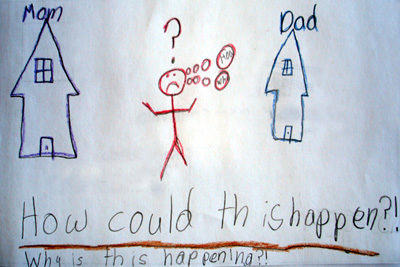Parenting children of divorce is difficult and, because an infant can’t talk, both parents need to stay in tune with their child’s behaviors, says divorce therapy expert. Here are some ways a parent can help his or her infant adjust to the new circumstances brought about by divorce.
It may be helpful to know how children of divorce usually react, according to divorce therapy expert.
Children and Divorce
The stress of divorce will manifest itself in different ways with different children depending upon the child’s personality, age, and level of maturity.
According to divorce therapy it is a general rule, young infants may show exaggerated stranger anxiety, even with their fathers.
Young toddlers may develop more extreme separation anxiety and mood swings.
Older toddlers will often have regression with sleeping and toilet training.
Preschoolers may exhibit signs of anger and grief, or worry that both parents will abandon them.
School age children often tend to consider one parent as good and the other parent as bad.
Teenagers will probably act out or withdraw due to anger or depression, adds divorce therapy counselor.
Infants and Divorce
Infants may appear to be too young to understand what is going on with the divorce, but they still respond to stressful events. Babyhood is the time when a child begins to bond and form social relationships.
During divorce, babies can feel tension in the home and can become excessively irritable and clingy in response to their parents’ moods. Often, an infant will develop stranger anxiety around the parent with whom he or she has had less contact or around any new adult.
Young Infants
As per divorce therapy tutorial it is learned infants pick up on their parents’ moods. If a parent is depressed or fighting with the other parent, a baby will often become fussy and less easily comforted. Sometimes infants withdraw and become uninterested in people, and this is also cause for concern.
Any mother or father who has questions about his or her baby’s behavior should discuss it with their pediatrician or call a nurse at their pediatrician’s office. Either of these two people will, also, be able to refer the parent to a mental health counselor, which may help a new parent. There is no reason to feel ashamed of talking to a counselor when times are tough. Everyone should have someone to talk to.
Older Infants and Young Toddlers
Separation anxiety and fear of strangers will begin in most children between the ages of 8 and 18 months. This is true even in families which are not divorcing, however this anxiety can be excessive during times of difficulty.
When there is a divorce, there are special steps that parents can take to help an infant with the transition. Both parents should understand that it is normal for a baby to prefer the primary parent over the other parent.
Unless there is some overriding issue, babies should have frequent contact with both parents.
Parents should work out communication problems, so there can be consistency, at both houses, concerning naps and feeding. Any changes or concerns should be discussed. However, while consistency is important, routines do not need to be identical.
Each parent must put the needs of the baby ahead of their own feelings toward the other parent.
Talking to other caregivers, such as relatives, babysitters, or daycare workers, will help the caregivers understand the baby’s actions. Sometimes caregivers can give helpful advice because the caregivers have dealt with other children and babies who have been through divorce.
Advice for Parents if can’t stop divorce
The most important thing to remember is to respond to the baby in a predictable and reassuring manner. Picking up a stressed out infant and cuddling or singing to him or her is especially important in a divorce, because this will help the baby develop an attachment, and will help him or her to feel secure. Responding right away to the infant’s crying, by changing or feeding them, is another important part of bonding.
Each parent should respond with love.
Helping Infants
Here are steps to help infants adjust to divorce if parents can’t stop divorce:
Parents should not fight near the baby.
Both mother and father should talk to the other parent.
Try to take extra time when transferring the baby to the other parent.
Keep consistent routines.
Both parents should give the child love and affection.
Even when depressed, parents should respond to the baby’s needs.
Sing and talk to the child (no one will laugh).
Keep the baby’s favorite toys and blankets nearby.
Talk to a pediatrician if the baby loses his or her appetite or seems overly irritable.
Divorce can be a difficult time for both mothers and fathers. Efforts should always be there to stop divorce. However, the baby is an innocent victim. Each parent should suck it up and act like an adult. And, even though the mother and father are in a conflict, each of them are still parents and should do whatever they can to help their child with this stressful transition, and sometimes that means talking to each other.
Information from this article is not intended to be a substitute for advice from a lawyer, financial planner, therapist, or other professional. Please consult a lawyer, pediatrician, mental health counselor, divorce therapy expert or other professional for specific advice. The best thing to do in married life is to put efforts how to stop divorce.
Women feel more pain of divorce and hence it is important to ask yourself how to make my husband love me again before things lead to divorce.
- How to support your child’s mental health: A parent’s guide - February 1, 2025
- Can data centers stay green? Balancing digital growth with clean energy - January 26, 2025
- Why Blockchain could be end of high fees, delays in global payments - January 17, 2025
- Abridge AI: Silent scribe transforming healthcare interactions - January 5, 2025
- What makes quantum AI a game-changer for technology - December 25, 2024
- How businesses must adapt to evolving cyber threats in 2025 - December 4, 2024
- How vaping stiffens blood vessels and strains lungs: Study - November 26, 2024
- OpenAI Codex or Google Codey? Finding the perfect AI for your code - November 18, 2024
- What Google’s Project Jarvis means for future of digital interaction - October 28, 2024
- 11 tips for creating engaging ad content - July 8, 2024




